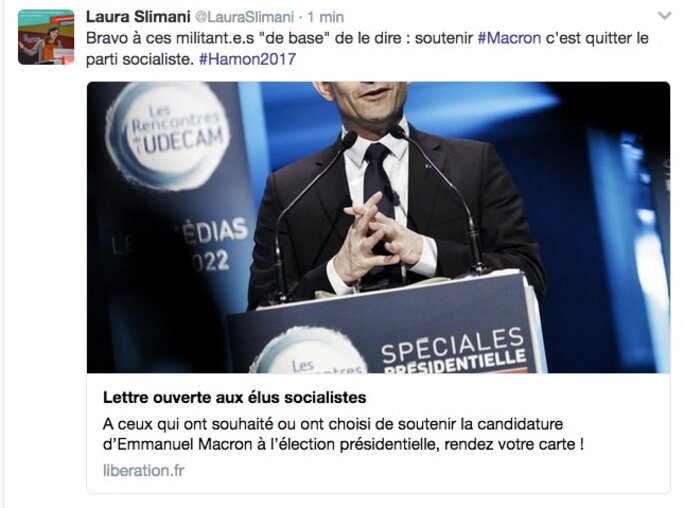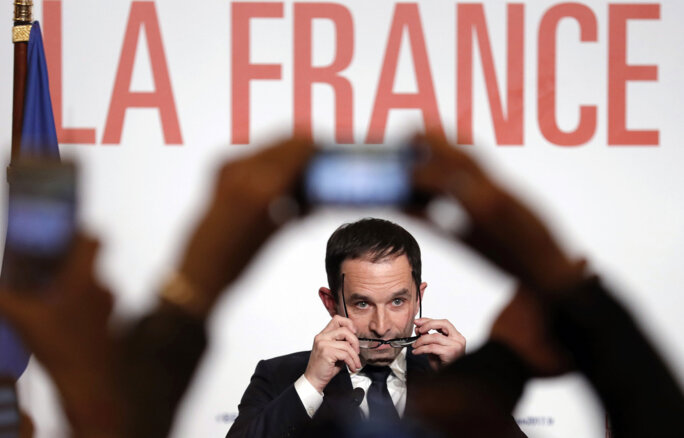The party is splitting in all directions. And in terms of his campaign, nothing is happening. Since winning the primary election at the end of January the official Socialist Party candidate Benoît Hamon has virtually been missing in action, drowned out by the continuing media coverage of the François Fillon 'fake jobs' scandal and by the criticism aimed at him by the right wing of his own party, many of whom are tempted to back the centrist candidate Emmanuel Macron. All this has left former education minister Hamon looking powerless, reduced simply to playing a walk-on part in a presidential election unlike any other.
On Thursday it was reported that the important figure of Jean-Yves Le Drian, defence minister and one of President François Hollande's closest political allies, will be backing former economy minister Macron. On Wednesday it had been the turn of former mayor of Paris Bertrand Delanoë to come out in favour of the independent candidate and former merchant banker, who is currently favourite in the polls to go into the decisive second round against the far-right Front National's Marine Le Pen. It was, Delanoë told France Inter radio, a question of choosing the most 'useful' vote to keep out the far right. He said: “We have to give strength to the candidate who will be able to beat Marine Le Pen … the fight against the extreme right is the priority battle. The effective vote in the first round [editor's note, there are two rounds of voting] is a vote for Macron,” he insisted.
But the former Paris mayor went still further, tackling head-on Benoît Hamon's “dangerous” policies. “I think that his manifesto is dangerous because it doesn't bring the Left together and because philosophically he is not, in relation to work, to Europe … in a position to produce real social progress,” said Bertrand Delanoë. There is nothing surprising in a leading figure in the PS proclaiming himself to be a social liberal. But his declarations will strengthen some members of the party apparatus, who are close to President Hollande or to former prime minister Manuel Valls and who are tempted to jump ship after their defeat in January's Socialist Party primary at the hands of Hamon.
Above all his comments help maintain the mood music of disunity and division that weakens any election campaign, and the defections are clearly not over yet. As well as Delanoë and Le Drian the president of the National Assembly, Claude Bartolone has also let it be known in an interview with Paris Match magazine that he is “ready” to vote for Macron in the first round if he judges that “democracy is in danger and it's the only alternative”. Hollande's key ally, the government spokesman and agriculture minister Stéphane Le Foll is also said to be making up his mind between Macron and Hamon. Each time the same arguments are paraded: that of choosing the most useful vote against the far right, plus a recital of the criticism that Hamon is too sectarian, too critical of Hollande's presidency or, quite simply, too far to the left.
The candidate's team, with its strategic hesitations and its sometimes chaotic organisation, seems both unable to stop the right wing of the party from torpedoing his campaign and from hitting back, either in form or in substance. Some people close to Benoît Hamon have been getting quite worked up in recent days, irritated by what one described as a “Care Bear riposte”. “We've had enough! We have to attack Macron,” says the same source. One campaign team member Laura Slimani, former president of the Young Socialists, is clearly on the same wavelength. In a Tweet, below, she applauds those party members who have pointed out that “to support Macron is to leave the Socialist Party”. The first signs of a change in strategy indeed came on Thursday when Hamon described Macron's presidential project as a “stepping stone” for Marine Le Pen and the FN.

Enlargement : Illustration 2

The majority of long-term Hamon supporters are convinced that, contrary to the dominant media view and that of a section of the party, these defections to Macron are rather a good thing for the coherence of Benoît Hamon's campaign. And that they also are also good in terms of giving the candidate credibility among an electorate of the Left that is disgusted by the PS and tempted to vote for the radical left candidate Jean-Luc Méclenchon. “Today a certain number of departures aren't bad for us because we know who voted for us in the primary,” says Antoine Détourné, a councillor at Arras in northern France and who has been working on Hamon's policies. “Delanoë has the air of someone on the Left but he's not part of the young guard. The problem we're seeing is that of people with long careers in the Socialist Party … they are not damaging farewells,” he says.
Though the socialist old guard or “elephants” as they are known may be popular within the party itself they are often removed from the younger and more left-wing electorate that Benoît Hamon has managed to mobilise in his campaign, and on whom he is still counting for the first round of the presidential vote. “Macron wants to incarnate renewal and modernity, but he's just attracting some old party bigwigs and those who've retired from politics,” says Hamon's campaign director Mathieu Hanotin. “If it's too hard for these socialists, well, let them go. What we're noticing is that more and more militants are proud of seeing the PS rediscover its true colours. The party is mobilising itself again, in a good way, and the 'old school' political behaviour of some only strengthens us.”
“The neoconservatives at the head of the party have the idea that we are, as a matter of course, not worthy of being in charge,” says the Member of Parliament Pouria Amirshahi. Having left the PS while an MP because of his disagreement with the government's policies, he has joined Hamon's campaign team to deal with foreign affairs issues. “In their eyes we are here illegitimately, exactly as the Right has always thought of the Left when it is in power. Yet while they have kept the appearance and apparatus of social democracy, they have become not just social liberals but neoconservatives. In Macron they've found a product they like and they've bought it.”
“It's by no means certain that the spectacle of Macron opening his arms wide and of ageing male liberals rushing towards him is so serious,” says another member of the campaign team who asked to remain anonymous. “If they feel more at ease with [centrist François] Bayrou and [Alain] Madelin [editor's note, a liberal and former economy minister] than with us, we won't cling on to them. We prefer to have with us women of the Left such as [Anne] Hidalgo, [Christiane] Taubira, [Najat] Vallaud-Belkacem, [Marisol] Touraine, [Marylise] Lebranchu and [Martine] Aubry [editor's note, respectively the current mayor of Paris, former justice minister, current education and health ministers, the former civil service minister and former head of the PS],” he says. “We're backing a noticeable and generational change on the Left and it's only normal that there is a deep divide inside the PS in relation to the issues of the future that we are supporting, between the real alternative that's being proposed and those who want to just continue to support liberalism.”
'Everything depends on the next three weeks'
But even if one accepts that Benoît Hamon's problem does not lie in the departure of “old liberal males”, the campaign is nonetheless invisible and inaudible. No one in his entourage denies it, even if campaign director Mathieu Hanotin repeats that he is “serene”. He insists: “We were promised a campaign where we would face 'Pasokification' [editor's note, meaning an abrupt electoral demise as happened with the Greek social-democrat party PASOK] down to 5%. At the moment we are ahead of Mélenchon and not far behind Fillon. Macron is at the same level as [François] Bayrou was in 2007 at the same time. And the campaign hasn't really started.”

Enlargement : Illustration 3

In fact, like Jean-Luc Mélenchon and his France Insoumise ('France Unbowed') movement, the socialist candidate is paying for a political climate that has become completely de-structured by the Fillon 'fake job' affair, by the fascination, including from the media, with Macron and with the threat of the Front National. He is also suffering from his own weaknesses: though he handled his primary campaign perfectly, right up to his victory on January 29th, Benoît Hamon has struggled to get going as a presidential candidate.
He became caught up in the longer than expected negotiations with the greens about the withdrawal of their candidate Yannick Jadot. A part of his team is also still involved in reaching a potential agreement with members of the Radical de Gauche party, a small centre left grouping which is traditionally an ally of the PS. Hamon's manifesto is also still being worked on in a number of areas, and decisions on this have still not been made. The team itself is still finding its feet. “In terms of disorganisation, it's less and less bad,” is how one of Hamon's allies puts it. The organisational set up has now been reinforced with the arrival of the greens and and the structure is now a little overloaded and the meetings often interminable. However, campaign staff constantly seek out the views of Benoît Hamon himself: everything is passed up to the candidate who has to decide on everything. “He is remaining very clear-headed,” explains one of his friends. “But everything relies on him.”
Hamon is hoping that his campaign can bounce back by the end of March by putting his key proposals at the centre of the debate. “We mustn't respond each time to departures and to declarations by other people,” says Antoine Détourné. “We mustn't be on the defensive and we must come back to the fundamentals of the proposals.”

“We can still recover but we have to make the most of our time, “ says MP Pouria Amirshahi. He is in favour of “sounding the Republic's alarm” faced with the threat from the FN and the bad reaction that a vote for Macron would produce. “With Macron we are continuing with the fuel which feeds disillusionment. With Hamon we are at last trying a new political response,” he says. “At moments of international chaos and moral crisis there have always been two responses, one from the Left, one from the Right, to the redefinition of the Republic.” To impose the Left's vision on the debate “everything is going to depend on the next three weeks”, says the MP.
On Thursday Hamon took part in the France 2 television programme Émission politique, a programme he participated in last December and which helped him launch his primary campaign. The same day saw the publication of his book 'Pour la génération qui vient' ('For the Generation that is coming') published by Éditions des Équateurs. This Friday he is setting out his proposals on Europe with the celebrated economist Thomas Piketty, while on March 19th he is taking part in a major rally in Paris. In the meantime his full presidential manifesto will be published. The socialists are hoping that it is not all too late.
--------------------------------------------------------------------------
- The French version of this article can be found here.
English version by Michael Streeter


